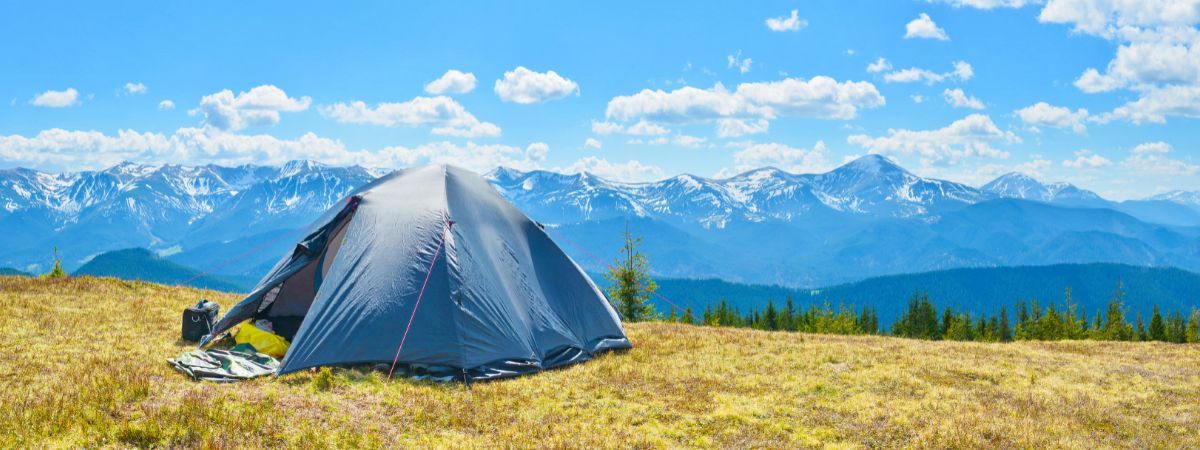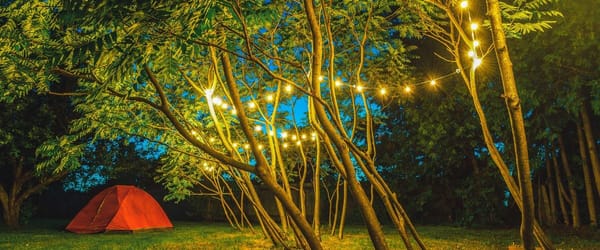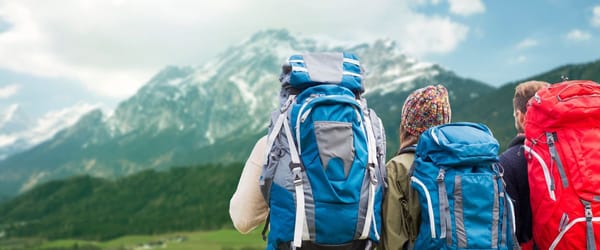Camping offers a unique opportunity to escape the hustle and bustle of everyday life, trading it in for the serenity, wonder, and rejuvenation that can only be found in the great outdoors.
There are so many types of camping out there that it can be hard to choose which one is right for you. I have lived through most of the different types of camping and Tent Camping is my favorites. It is so basic and back to nature. Just like what camping should be.
In a hurry? Click here to go directly to the 9 Different Types of Camping.
So gather your gear (Best Camping Tools), pack your sense of adventure, and join us as we delve deeper into the joys of camping – because the best memories are often made beneath the open sky.
Why do people want to go camping?
Amid the hustle and bustle of city life, it's easy to forget the importance of nature in our lives. However, the truth is that trees, forests, rivers, streams, and oceans offer us an escape from the chaos of daily living. By camping in nature, we can tap into the health-promoting benefits of fresh air, sunlight, and a tranquil environment. This immersive experience is the perfect way to recharge our batteries and maintain our motivation in all aspects of life.
Let's set the mood for camping
Imagine a world where the sky is your ceiling, the earth is your floor, and the gentle rustle of leaves is your lullaby. Welcome to the enchanting realm of camping, an age-old tradition that connects us with nature and allows us to rediscover the simple pleasures of life.
As you drift off to sleep under a canopy of stars, you'll feel the weight of the world lifting off your shoulders. You'll find yourself immersed in the comforting embrace of nature, as the cool breeze whispers secrets only known to the ancient trees that surround you.
Morning greets you with the harmonious symphony of birdsong, as the golden sun illuminates the dew-kissed landscape, revealing the breathtaking beauty of your temporary home.
With every crackling campfire, every shared story, and every awe-inspiring sunset, you'll uncover a new facet of this magical experience that will leave you longing for more.
Whether you're a seasoned adventurer or a curious newcomer, there's a style of camping tailored just for you – from the classic tent camping experience to the modern comforts of RV camping, the luxurious allure of glamping, or the raw, untamed thrill of wilderness and survivalist camping.
With the many different types of camping, the basic remains the same, that is spending the night under the stars and close to nature. Each type offers a distinct experience and allows you to connect with nature in various ways. The magic is always there!
Let's explore the different options available.
9 Different Types of Camping
- Tent Camping
- RV / Camper / Campervan Camping
- Car Camping
- Car Sleeping Camping
- Backpacking Camping
- Glamping
- Overlanding Camping
- Beach Camping
- Winter Camping
And I have included a brief introduction into 4 additional types of camping less popular, but nevertheless can be fun and fulfilling. Just not the usual type of camping that you would normally associate with camping.
- Canoe Camping
- Wild Camping
- Motorcycle Camping
- Hammock camping
Before we start our exploration, I just want to add that I have placed more emphasis on the pros and cons of each option. This allows you to make a better decision on which type of camping best suits you and what the camping trip entails, or rather demands. Just click on the dropdown arrow to expand the section.
Tent Camping
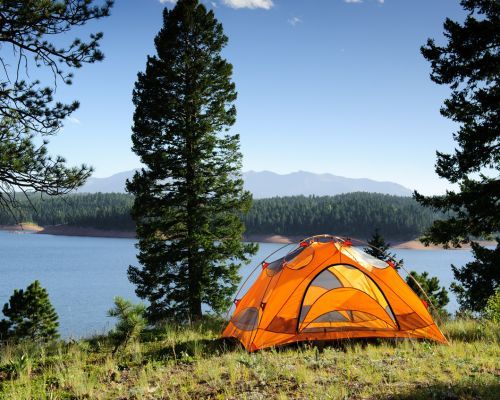
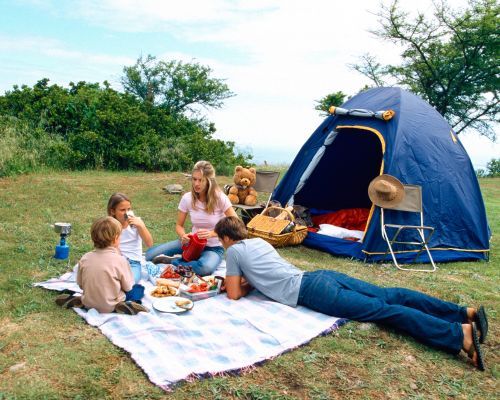
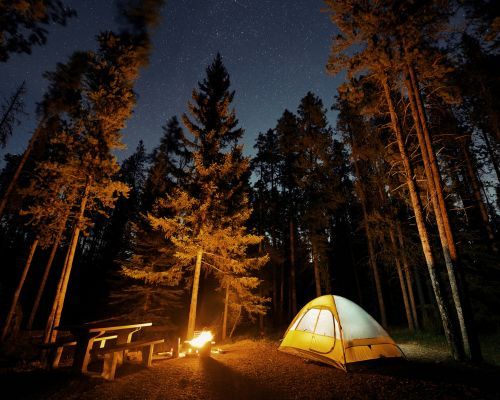
Tent Camping In The Great Outdoors. I love Tent Camping - just me, the tent and mother nature.
This is the most traditional camping, where individuals or groups set up tents in designated camping areas, wilderness sites, or even in your backyard, hence the term Backyard Camping. Tent camping allows you to immerse yourself in nature and offers a more rustic experience. You’ll need to bring your tent, sleeping bags, camping gear, and camping lantern.
Most tents today are waterproof and relatively easy to set up. It will keep you warm and dry, and oh yes, the critters stay out! And with your sleeping bags, you are in good hands. Unless of course, the weather takes a turn for the worse with heavy rain or wind.
Pros of Tent Camping
Immersion in Nature: Tent camping allows you to immerse yourself in nature and fully experience the sights, sounds, and smells of the outdoor environment. It provides a more authentic and close-to-nature camping experience compared to other forms of camping.
The flexibility of location: With a tent, you have the freedom to camp in various locations, including remote wilderness areas or off-the-beaten-path sites that may not be accessible to larger camping vehicles, or in your backyard.
Cost-effective: Tent camping is generally more affordable compared to other camping options, such as RVs or campers, as it requires minimal investment in equipment. Tents are available at different price points, making them accessible to a wide range of campers. Fees for camping sites are generally lower compared to other types of camping.
Availability of campsites: Many campgrounds and outdoor areas are designed specifically for tent camping, offering affordable camping fees and amenities such as fire pits, picnic tables, and access to hiking trails or recreational activities.
Lightweight and portable: Tents are lightweight and compact, making them easy to transport and carry in a backpack. This allows for greater mobility and flexibility during camping trips, especially for activities like hiking or backpacking.
Variety of tent options: Tents come in different sizes, shapes, and designs to accommodate various group sizes and weather conditions. From small solo tents to large family-sized tents, there are options available for different camping needs.
Personal space: Tents provide a private and enclosed space for sleeping and personal belongings, offering a sense of privacy even when camping in crowded campgrounds.
Seclusion in nature: Tent camping allows you to find more secluded camping spots, away from other campers or noise, providing a tranquil environment for relaxation and solitude.
Cons of Tent Camping
Weather-dependent: Tent camping exposes you directly to weather conditions such as rain, wind, heat, or cold. Depending on the quality and design of your tent, it may offer limited protection in extreme weather conditions.
Comfort limitations: Tents generally lack the amenities and comforts of larger camping options. Sleeping on the ground may be less comfortable than a bed, and limited space can restrict movement and storage options.
Setup time and effort: Pitching a tent requires time, effort, and familiarity with the equipment. Setting up tents in adverse weather conditions or challenging terrains can be more demanding and time-consuming.
Maintenance and durability: Tents are susceptible to wear and tear, especially when exposed to rough conditions, sharp objects, or prolonged sun exposure. Regular maintenance, proper storage, and occasional repairs are necessary to ensure the longevity of the tent.
Space constraints: Tents have limited interior space, which can be a challenge when storing gear, and personal belongings, or when camping with a larger group. Organizational skills and efficient packing are essential.
Lack of amenities: Tent camping often lacks amenities such as kitchenettes, showers, or electrical hookups. Campers may need to rely on portable camping stoves, communal facilities, and other equipment for cooking, hygiene, and comfort.
Despite the challenges, tent camping offers a more authentic and immersive outdoor experience, allowing you to connect with nature and enjoy the simplicity of camping.
RV-Campers-Campervan Camping
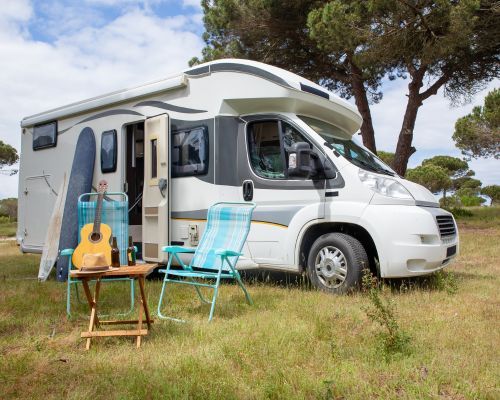
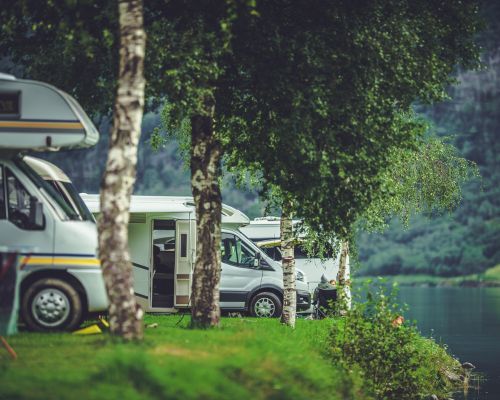
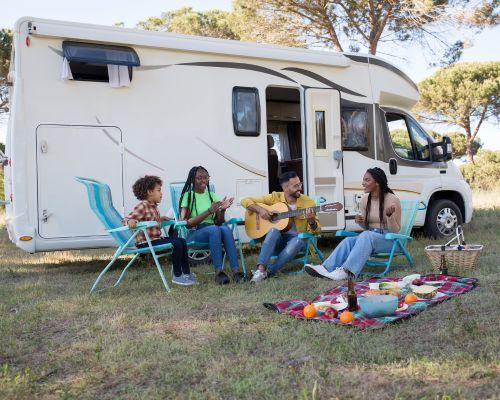
RV, Camper& Campervan Camping
Camping with a recreational vehicle (RV) or campervan provides a more comfortable and convenient option. RV camping is perfect for those who want some of the comforts of home while out in nature.
These vehicles are equipped with sleeping quarters, cooking facilities, and sometimes even bathrooms. RVs are available for rent or purchase, and you can camp in designated RV parks or remote locations.
RV camping allows for greater mobility and access to amenities like electricity and running water, as well as a range of camping sites available with hookups for power and water.
If you are inclined to have the luxuries of home with you whilst camping, this option is a definite choice for you. Comes rain or shine, cold or hot, this RV / Campervan will keep you comfortable and peaceful, yet you are just a door away from mother nature.
Pros of RV/Campers/Campervan Camping
Convenience and Comfort: RV, Campers & Campervan camping offers the convenience of bringing your home on wheels, providing comfortable sleeping quarters, kitchen facilities, and sometimes even bathrooms.
Access to Amenities: RVs, Campers, and Campervans often have access to amenities like electricity, running water, and waste disposal, making camping more convenient and comfortable.
Mobility: With an RV, Campers, or campervan, you can explore many different destinations with the freedom of mobility.
Cons of RV/Campers/Campervan Camping
Cost and Maintenance: RVs, Campers, and Campervans can be expensive to purchase or rent, and they require ongoing maintenance, fuel, and camping site fees, making them a more costly camping option.
Limited Accessibility: Some remote or off-road areas may not be easily accessible by RVs, limiting your camping destinations and potentially missing out on more secluded natural environments.
Size: Most camping sites have size restrictions for vehicles, so you may need to find larger sites or campgrounds
For a more detailed comparison of the three types of Camping, learn more about RVs, Campers, and Campervans.
Car Camping
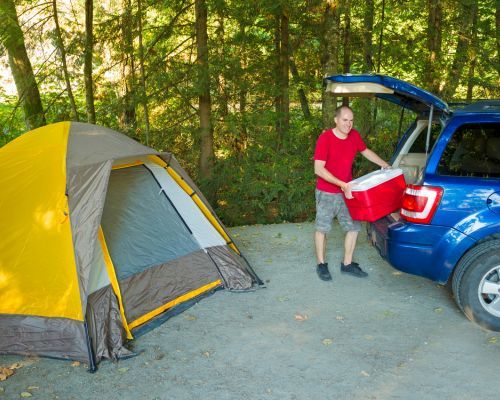
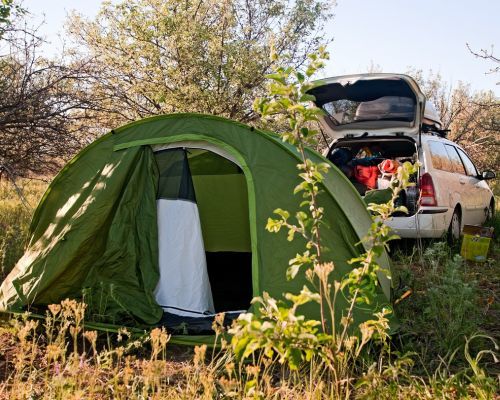
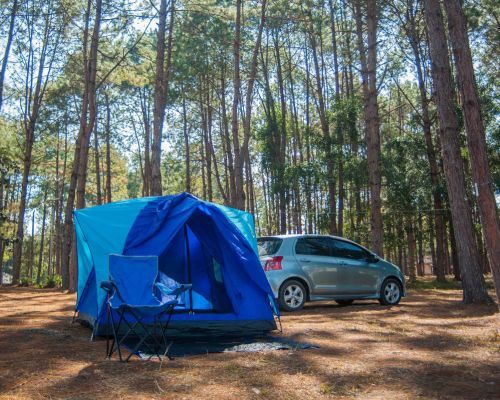
Car Camping In The Outdoor& National Parks
Car camping refers to the practice of camping in designated campgrounds or other outdoor areas where you can park your vehicle nearby and set up your tent near your vehicle, utilizing it as a base for your camping experience.
With car camping, you have the convenience of bringing along more gear, supplies, and amenities compared to traditional backpacking camping. It can be suitable for you and your family if you prefer a less rugged experience.
Some refer to SUV Tent camping as Car Camping as the tent is connected to your SUV and form part of the tent. Or you can also mount your tent on the rooftop of your SUV or vehicle, otherwise known as rooftop tent camping.
Pros of Car Camping
Ease of transportation: Car camping allows you to transport a larger quantity of camping gear, food, and supplies, as you have the storage capacity of your vehicle. This eliminates the need for carrying heavy backpacks or limiting your gear choices.
Comfort and convenience: With the ability to pack more gear, you can create a comfortable camping setup with larger tents, inflatable mattresses, camping chairs, and other amenities that enhance your camping experience.
Accessibility to amenities: Car camping often takes place in established campgrounds that offer amenities such as toilets, potable water, picnic tables, and fire rings. These facilities can enhance your comfort and convenience during your camping trip.
Exploring different locations: Car camping provides the flexibility to explore various campgrounds and outdoor areas. You can easily drive to different destinations, set up camp, and then use your vehicle to explore the surrounding area or go on day trips.
Option for extended stays: With the additional space in your vehicle, you can carry more food and supplies, allowing for longer camping trips without the need for frequent resupplying. This is particularly beneficial for extended outdoor adventures or remote camping locations.
Protection from the elements: Car camping provides a secure shelter from adverse weather conditions such as rain, wind, or extreme temperatures. You can retreat to your vehicle for warmth and protection if needed.
Enhanced security: Sleeping in a vehicle can offer a higher level of security compared to tent camping, as it provides a physical barrier between you and potential wildlife or unwanted visitors. It can also deter theft, as your gear and belongings can be stored securely in your locked vehicle.
Cons of Car Camping
Crowded campgrounds: Popular campgrounds may be crowded, particularly during peak camping seasons. This can limit your privacy and tranquility, especially if you prefer a more secluded camping experience.
Reservation requirements: Some campgrounds require reservations, especially during busy periods. This may limit spontaneity and flexibility in your camping plans.
Restricted access: Car camping is typically limited to established campgrounds or areas accessible by roads. If you prefer more remote or off-the-grid camping experiences, car camping may not provide the level of solitude and wilderness you desire.
Environmental impact: Increased accessibility and popularity of car camping can have a greater impact on the environment due to higher visitor numbers and vehicle use. It's important to practice Leave No Trace principles and follow campground regulations to minimize ecological impact.
Mobility restrictions: Once you set up camp, your vehicle may be less available for exploration or day trips, limiting your mobility during your stay.
Mechanical issues: Relying on your vehicle for camping means there is a possibility of mechanical issues or breakdowns. It's essential to have a backup plan, basic knowledge of vehicle maintenance, and be prepared for unexpected situations.
Car camping offers a balance between convenience, comfort, and accessibility while still providing a connection to nature and the outdoors.
Car Sleeping Camping
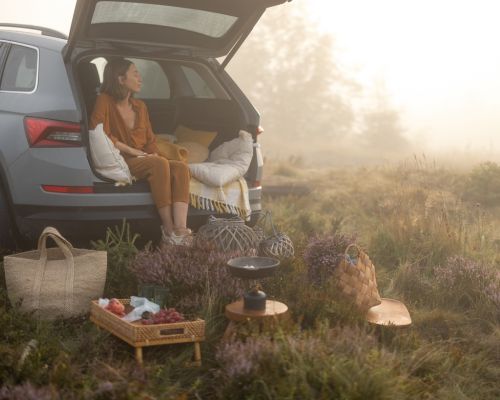

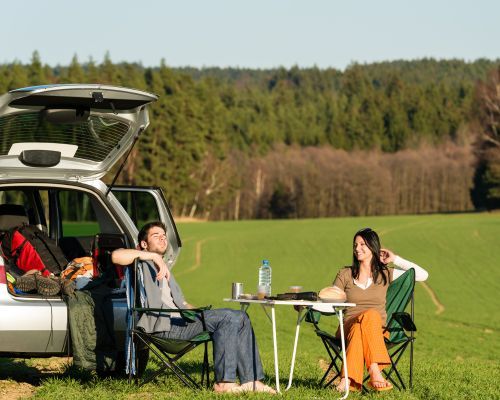
Car Sleeping Camping - The Easiest Types of Camping and the safest from Snake Bites.
Car sleeping, also known as car camping or sleeping in your vehicle, refers to the practice of using your car as a makeshift sleeping space while camping. It is probably one of the easiest types of camping.
You sleep inside your car, and if weather permits, you can leave your car door window open for that smell of fresh air, infused with nature at its best.
I know of many who purchased mattresses that can be placed in the back row of their car and they form almost a full bed, with support for the foot well. And for cars such as station wagons, SUVs, or minivans, the flexibility of putting the back row(s) down to form a huge flatbed.
Then there are pickup trucks. With a mattress thrown on the truck bed or with a sleeping bag, you can well imagine the scenery up there, laying there staring at the heavenly bodies filling up the sky.
Pros of Car Sleeping Camping
Mobility: Sleeping in your car allows you to easily move from one location to another without the need to set up and dismantle a tent or camper. This flexibility enables you to explore different camping spots and change your itinerary as desired.
Quick setup: With car sleeping, you can simply recline the seats or set up a sleeping platform in the back of your car, eliminating the time-consuming process of setting up a tent or camper.
Shelter from the elements: Your car provides a protective barrier from adverse weather conditions such as rain, wind, extreme temperatures, or even from snakes, ensuring a more comfortable sleeping environment. Unless, of course, you are in the open back of your pickup truck.
Affordability: Car camping eliminates the need to invest in expensive camping gear like tents, sleeping bags, or campers. It can be a budget-friendly option, especially for those who already own a car.
No campsite fees: Depending on local regulations, car sleeping may allow you to avoid paying campsite fees, making it a more economical choice for overnight stays.
Cons of Car Sleeping Camping
Restricted sleeping area: Unless you have a spacious van or SUV, the sleeping space in a car can be quite limited. This may result in discomfort and restrict your ability to stretch out fully during sleep.
Lack of amenities: Unlike traditional camping setups or RVs, car sleeping usually doesn't offer amenities like a kitchen, bathroom, or seating area. You may need to rely on public facilities or portable camping gear for cooking, hygiene, and relaxation.
Local regulations: It's important to research and comply with local laws and regulations regarding car sleeping, as some areas may prohibit or restrict overnight stays in vehicles.
Security concerns: Sleeping in a car, especially in remote or unfamiliar locations, can raise safety concerns. It's essential to choose well-lit and secure areas to minimize risks and ensure personal safety.
Privacy concerns: Car sleeping may lack the privacy provided by tents or campers, as your sleeping area is within public view. This can make some individuals uncomfortable, particularly in crowded or busy areas. A workaround solution is to hang a curtain or even a towel on the windows.
Restricted mobility: While car sleeping offers mobility advantages, it also limits your ability to separate your sleeping area from your transportation. This means you might need to rearrange your setup if you wish to use your vehicle for daytime activities.
Car sleeping can be a practical and cost-effective option for campers who prioritize flexibility, quick setup, and mobility. However, it's important to consider the limitations in terms of space, comfort, privacy, and safety.
Backpacking Camping
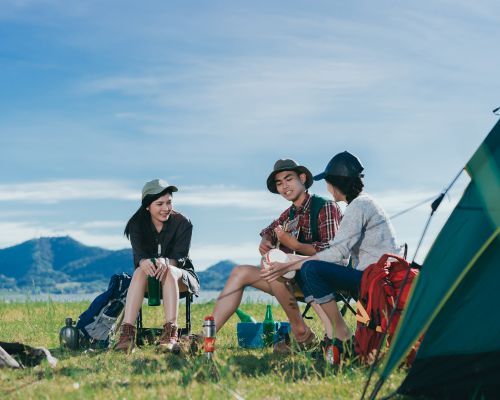

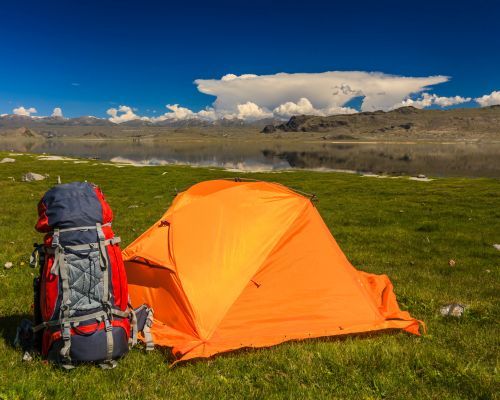
Backpacking Camping In The Wilderness
Backpacking camping, also known as wilderness camping or backcountry camping, involves carrying all necessary camping gear and supplies in a backpack and trekking to remote or less accessible areas for camping. It is a more adventurous and self-reliant form of camping that allows you to explore more secluded and pristine natural environments.
Given the nature of the camping requirements and the weight of all the gear and supplies, you have to be fit and healthy. In addition, it is better to be in a group rather than solo, for safety reasons.
Pros of Backpacking Camping
Remote locations: Backpacking camping allows you to reach remote and less crowded areas that are inaccessible by vehicles or require long hikes. This provides opportunities for solitude and a deeper connection with nature.
Exploration and discovery: Backpacking camping encourages the exploration of diverse landscapes, hidden trails, and stunning vistas. It allows you to discover unique and untouched natural environments that are often not accessible through other forms of camping.
Close contact with nature: Backpacking camping provides a more immersive experience by allowing you to live directly in nature without the barriers of vehicles or established campgrounds. You can fully appreciate the sounds, sights, and scents of the wilderness.
Wildlife encounters: Backpacking in remote areas increases the chances of encountering wildlife in their natural habitats, allowing you to observe and appreciate wildlife from a safe distance.
Independence and self-reliance: Backpacking camping offers a high level of independence as you carry all the necessary supplies on your back. You have the freedom to choose where and when to camp, altering your itinerary as desired.
The flexibility of camping spots: With backpacking, you are not limited to designated campgrounds or established sites. You can set up camp at picturesque locations, by serene lakes, or near stunning mountain peaks, enjoying the flexibility to choose your ideal camping spot. But remember to clean up behind you.
Fitness and adventure: Backpacking camping requires physical exertion, offering a great opportunity for exercise, improving stamina, and building strength. The challenges of backpacking add an element of adventure and excitement to the camping experience.
Mental well-being: Spending time in nature, away from the hustle and bustle of daily life, can provide mental rejuvenation, stress reduction, and a sense of tranquility. Backpacking camping allows for deeper immersion in the natural environment, contributing to mental well-being.
Cons of Backpacking Camping
Physical fitness requirements: Backpacking camping demands a certain level of physical fitness and endurance, as you need to carry all your camping gear, food, and water on your back for extended periods.
Challenging terrains: Backpacking often involves traversing rugged and uneven terrains, steep inclines, or challenging trails. This can be physically demanding, particularly for those with limited hiking experience or physical limitations including survival camping training.
Lightweight gear: Backpacking camping requires specialized lightweight and compact camping gear to minimize the weight and bulk of your backpack. High-quality equipment can be more expensive than traditional camping gear.
Navigation and survival skills: Backpacking in remote areas requires navigation skills, including map reading, compass use, and familiarity with the terrain. Basic survival skills, such as fire building and first aid, are also crucial in case of emergencies.
Basic living conditions: Backpacking camping involves sacrificing some comforts and conveniences. You may sleep on the ground in a tent or bivvy, cook on portable stoves, and rely on limited amenities like natural water sources or portable filters.
Limited storage and hygiene facilities: Due to the restricted space in your backpack, storage options for gear and personal belongings are limited. Additionally, backpacking often lacks access to showers, toilets, and bathing facilities commonly available at established campgrounds, requiring alternative hygiene practices such as using wet wipes or bathing in natural bodies of water.
Exposure to the elements: Backpacking camping exposes you directly to weather conditions, including rain, wind, heat, or cold. Proper gear, including rain gear, insulating layers, and a sturdy tent, is necessary to protect against the elements.
Safety concerns: Backpacking in remote areas carries inherent risks, such as getting lost or encountering wildlife. Adequate preparation, including navigation tools, first aid knowledge, and bear safety precautions (where applicable), is essential to mitigate potential hazards.
Shorter stays: Due to the physical demands and limited resources carried on your back, backpacking camping is typically suited for shorter camping trips, ranging from a few days to a couple of weeks.
Food and water considerations: Carrying enough food and water for the duration of your backpacking trip can be a challenge, as both can add significant weight to your backpack. Planning and rationing are crucial to ensure adequate sustenance.
Backpacking camping offers a rewarding and adventurous experience for outdoor enthusiasts who seek solitude, exploration, and a deeper connection with nature. However, it requires physical fitness, specialized gear, and a willingness to embrace the challenges of self-sufficiency.
Glamping
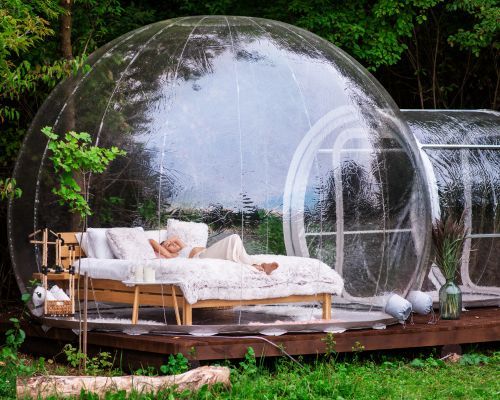
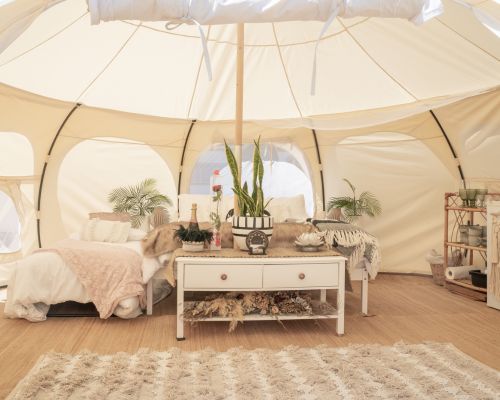
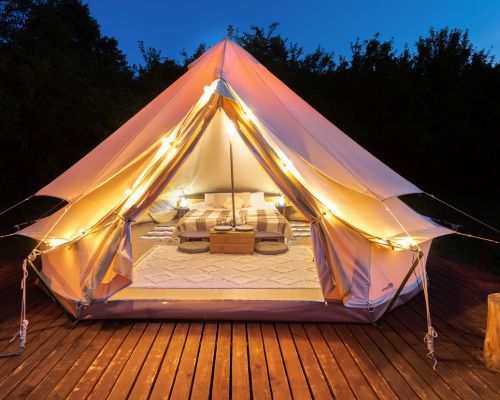
Glamping - Luxurious Accomodations Outdoors
Glamping, a portmanteau of "glamorous" and "camping," otherwise known as Glamorous Camping, refers to a luxurious and more comfortable form of camping that combines elements of outdoor adventure with high-end amenities and accommodations.
It involves staying in pre-erected tents or other accommodations that are more upscale and often equipped with amenities such as real beds, furniture, and even en-suite bathrooms, such as spacious tents, yurts, cabins, treehouses, or even eco-friendly domes.
It offers a unique camping experience that caters to individuals who seek the beauty of nature and who want to experience the outdoors without sacrificing comfort.
Pros of Glamping
High-end accommodations: Glamping provides luxurious and well-appointed accommodations. These accommodations often feature comfortable beds, plush furniture, electricity, heating or air conditioning, and private bathrooms.
Premium amenities: Glamping sites often offer a range of amenities and services, including hot tubs, gourmet dining options, Wi-Fi access, spa facilities, and concierge services. This ensures a high level of comfort and convenience throughout your camping experience.
Stunning locations: Glamping sites are typically located in picturesque environments, such as national parks, private estates, or breathtaking natural landscapes. They allow guests to enjoy panoramic views and immersive nature experiences without compromising on comfort.
Exclusive and private experiences: Glamping accommodations are often designed to offer privacy and seclusion. This allows guests to enjoy a peaceful and intimate connection with nature away from crowds and busy campgrounds.
No camping gear required: One of the advantages of glamping is that you don't need to invest in camping gear or carry heavy equipment. Everything you need for a comfortable stay is provided on-site, reducing the need for extensive planning and preparation.
Accessibility for all: Glamping accommodations are often designed to be accessible to a wide range of individuals, including those with mobility limitations or special needs. This ensures that more people can experience the joys of camping comfortably and inclusively.
Enhanced security measures: Glamping sites typically prioritize guest safety and security. They may have security personnel, gated access, or surveillance systems in place, providing peace of mind for guests.
Reduced exposure to elements and wildlife: Glamping accommodations offer protection from inclement weather conditions, bugs, and wildlife encounters. This makes it a suitable option for those who may be concerned about the challenges and uncertainties of traditional camping.
Cons of Glamping
Elevated price point: Glamping experiences tend to be more expensive compared to traditional camping. The luxurious accommodations, premium amenities, and personalized services contribute to the higher cost of the experience.
Limited budget options: Glamping may not be feasible for travelers on a tight budget, as the price point often reflects the quality of the accommodations and services provided.
Reduced rusticity: Glamping, by design, focuses on comfort and luxury. This means that some of the traditional aspects of camping, such as setting up tents, cooking over an open fire, or sleeping on the ground, may be absent. This can result in a less authentic camping experience for those seeking a closer connection with nature.
Less self-reliance: Glamping experiences often involve a high level of service and staff assistance, reducing the need for self-sufficiency and problem-solving that is typically associated with traditional camping.
Proximity to other guests: Depending on the glamping site and its layout, accommodations may be near each other. This can lead to reduced privacy and a higher likelihood of encountering other guests during your stay.
Limited availability: Glamping accommodations can be in high demand, particularly during peak seasons or in popular locations. This limited availability can make it challenging to secure a reservation, especially for last-minute bookings.
Booking restrictions: Glamping sites often have specific check-in and check-out times and may require minimum stay durations, limiting flexibility in planning your camping trip.
Less immersion in the natural environment: Glamping accommodations, while providing comfort, may create a barrier between guests and the surrounding natural environment. This can result in a somewhat disconnected experience compared to traditional camping, where the focus is on being fully immersed in nature.
It's important to note that the pros and cons of glamping can vary depending on the specific site and the individual's preferences. Glamping offers a luxurious and convenient alternative to traditional camping, allowing individuals to enjoy the beauty of nature while enjoying upscale accommodations and amenities. However, it may lack the rustic charm and authenticity of traditional camping and can be cost-prohibitive for some.
Overlanding Camping
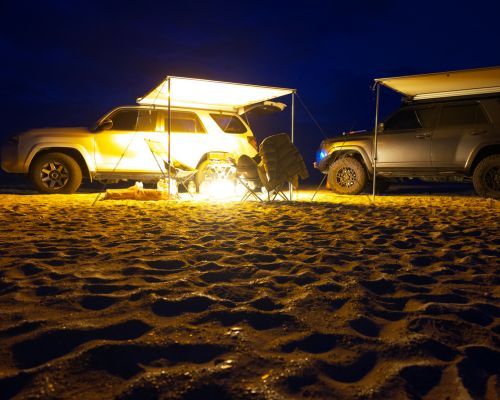
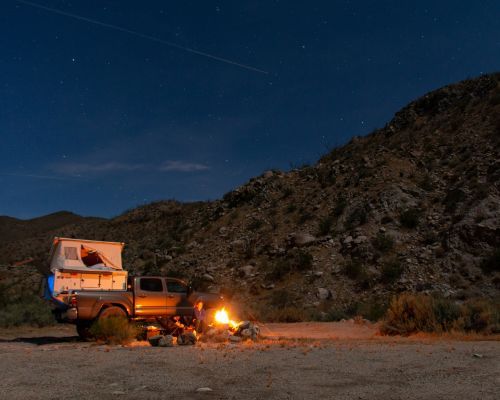
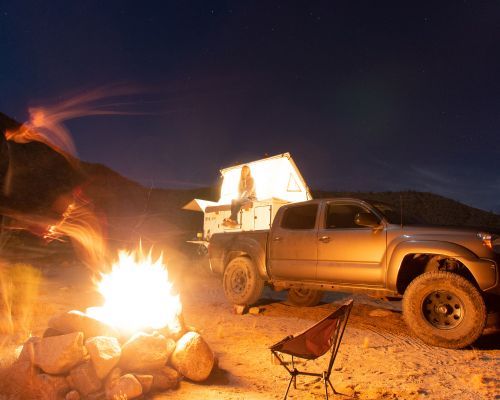
Overlanding Camping - Adventure with Excitement
Overlanding is a form of self-reliant, long-distance travel that typically involves driving or riding in a purpose-built vehicle, such as a 4x4 SUV or a camper van, to explore remote and off-road destinations. It combines elements of camping, outdoor adventure, and vehicle exploration, allowing travelers to experience a sense of freedom, adventure, and connection with the natural world.
Overlanders often explore remote locations and embrace self-sufficiency in their outdoor adventures.
Pros of Overlanding Camping
Off-the-beaten-path destinations: Overlanding allows travelers to venture into remote and less-visited locations that are not easily accessible by conventional means of transportation. This offers the opportunity to explore unspoiled landscapes, encounter unique wildlife, and discover hidden gems off the tourist trail.
Flexibility and freedom: Overlanding provides the freedom to choose your itinerary and explore at your own pace. You can adapt your route and stay longer in places that captivate you, allowing for a more immersive and authentic travel experience.
Self-reliance: Overlanding promotes self-sufficiency as you carry essential supplies, camping gear, and provisions in your vehicle. This allows you to be self-sustaining and less dependent on external facilities or services, offering a greater sense of freedom and adventure.
Remote camping opportunities: Overlanding provides the ability to camp in remote locations, away from crowded campgrounds or established sites. This allows for a more secluded and intimate camping experience, closer to nature.
Terrain and weather flexibility: Overlanding vehicles are designed to handle a variety of terrains and weather conditions, including off-road trails, muddy tracks, and rugged landscapes. This versatility enables travelers to access remote areas and navigate challenging environments.
Customization options: Overlanding vehicles can be customized to fit specific needs and preferences, including adding rooftop tents, suv tents, storage solutions, solar panels, or kitchen setups. This allows for personalized and comfortable living spaces during the journey.
Connection with nature: Overlanding provides an immersive outdoor experience, allowing travelers to spend more time in nature and appreciate the beauty of the landscapes they encounter. You can wake up to breathtaking views, enjoy campfires under starlit skies, and engage in outdoor activities such as hiking, wildlife spotting, or photography.
Cultural immersion: Overlanding often involves interacting with local communities, experiencing different cultures, and gaining insights into the lifestyles and traditions of the places visited. It offers opportunities for meaningful cultural exchanges and learning experiences.
Cons of Overlanding Camping
Vehicle investment: Overlanding requires a specialized vehicle or modifications to an existing vehicle, which can involve a significant initial investment. Purchasing or outfitting a suitable vehicle with the necessary equipment, such as roof racks, suspension upgrades, or off-road tires, can add to the overall cost.
Ongoing maintenance and repairs: Overlanding vehicles endure more wear and tear due to challenging terrain and extended travel durations. Regular maintenance and potential repairs can be more frequent and expensive compared to regular commuter vehicles.
Longer travel durations: Overlanding often involves extended travel periods, making it less suitable for individuals with limited time availability or tight schedules. The need to navigate challenging terrains and remote locations can result in slower travel speeds and more time on the road.
Border crossings and permits: Overlanding across multiple countries may require additional paperwork, visas, and permits. Navigating bureaucratic procedures and border crossings can be time-consuming and may add complexity to the journey.
Camping limitations: While overlanding vehicles provide a level of comfort, they may not offer the same level of comfort as traditional RVs or glamping accommodations. Sleeping arrangements may be in rooftop tents, sleeping bags, or compact sleeping quarters within the vehicle, which may not be as spacious or luxurious.
Limited amenities: Overlanding typically involves basic amenities, such as portable stoves, coolers, and portable showers. While sufficient for most camping needs, they may lack the convenience of full kitchens, bathrooms, or electricity found in other forms of camping.
Technical driving skills: Overlanding often requires off-road driving skills and knowledge of vehicle recovery techniques. Navigating challenging terrain, river crossings, or steep inclines demands a level of expertise and confidence behind the wheel.
Safety and emergencies: Overlanding can expose travelers to potential risks, such as getting stuck in remote areas, vehicle breakdowns, or encountering hazardous wildlife. Preparedness, including knowledge of emergency procedures, first aid skills, and carrying essential safety equipment, is crucial.
Ecological responsibility: Overlanding in fragile ecosystems requires responsible practices to minimize the environmental impact. It's essential to follow Leave No Trace principles, respect wildlife and protected areas, and adhere to local regulations to preserve the natural environment for future generations.
It's important to note that the pros and cons of Overlanding can vary depending on factors such as location, vehicle setup, and individual preferences. Overlanding offers a unique and adventurous way to explore remote destinations, connect with nature, and experience a sense of freedom on the open road.
However, it requires careful planning, investment in suitable equipment, and a willingness to embrace the challenges and uncertainties of off-road travel.
Beach Camping
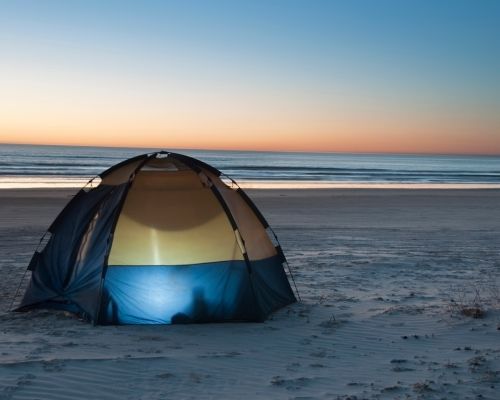
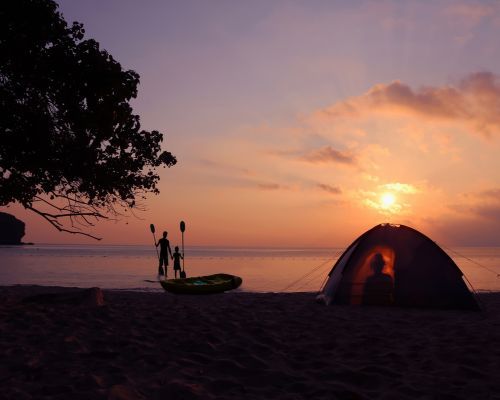
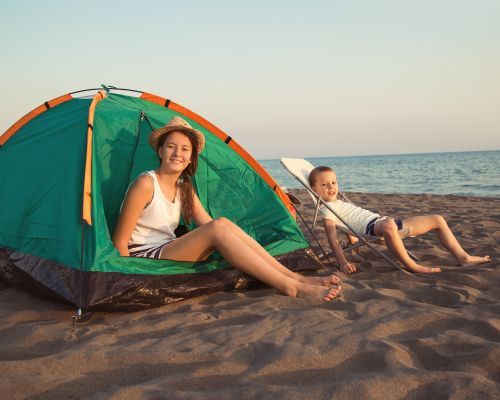
Beach Camping By The Seaside Caress By The Ocean Breeze
Beach camping refers to camping on or near a beach, either in designated beach camping areas or in remote coastal locations where camping is permitted. It offers a unique camping experience with the soothing sound of waves, beautiful coastal scenery, and the opportunity to enjoy various beach activities such as swimming, sunbathing, sea sports, and beach-related activities.
Pros of Beach Camping
Scenic beauty: Beach camping provides breathtaking views of the ocean, sandy shores, and coastal landscapes. The serene atmosphere and the sound of waves crashing against the shore create a tranquil and relaxing ambiance.
Sunrises and sunsets: Beach camping offers the opportunity to witness spectacular sunrises and sunsets over the water. These natural displays of colors can be truly mesmerizing and provide memorable experiences.
Swimming and water sports: Beach camping allows you to enjoy swimming, surfing, snorkeling, paddleboarding, or other water activities right at your doorstep. You can cool off in the ocean and take advantage of the water sports opportunities available.
Beachcombing and shell collecting: Exploring the shoreline for seashells, driftwood, or other natural treasures is a popular activity during beach camping. It offers the chance to connect with nature and discover unique coastal finds.
Beachside relaxation: Beach camping provides an ideal setting for relaxation, whether it's sunbathing on the sand, reading a book under a beach umbrella, or simply unwinding in a hammock while listening to the waves. It offers a peaceful environment to escape from daily routines and enjoy a slower pace of life.
Outdoor cooking and dining: Beach camping allows for enjoyable outdoor cooking experiences, such as barbecuing fresh seafood or grilling by the campfire. Dining al fresco with the sound of waves as a backdrop adds to the overall camping experience.
Coastal wildlife sightings: Beach camping provides opportunities to observe a variety of coastal wildlife, such as seabirds, dolphins, seals, or even whales in some regions. It offers a chance to connect with marine ecosystems and appreciate the diversity of coastal fauna.
Beach conservation and exploration: Beach camping encourages a closer connection to nature and can promote environmental awareness. Exploring the local dunes, and tide pools, or participating in beach clean-ups fosters a sense of responsibility for protecting these natural habitats.
Cons of Beach Camping
Sun, wind, and weather: Beach camping exposes you to the elements, including intense sun, strong winds, and rapid weather changes. It's essential to be prepared with appropriate sun protection, wind-resistant equipment, and adequate shelter to stay comfortable and safe.
Sand and salt: The sandy beach environment can present challenges, such as sand getting into tents, sleeping bags, or cooking equipment. The corrosive nature of saltwater can also affect the longevity of certain gear or electronics.
Lack of facilities: Some beach camping areas may have limited or no access to amenities such as restrooms, showers, or potable water. This requires more self-sufficiency and planning to ensure you have sufficient supplies and equipment.
Crowded during peak seasons: Popular beach camping areas can get crowded during peak seasons or holidays, reducing privacy and tranquility. It's advisable to plan your trip during quieter periods to avoid overcrowding.
Permits and restrictions: Many beach camping areas have specific regulations and permit requirements, such as limited camping seasons, fire restrictions, or restrictions on certain activities. It's essential to research and comply with local regulations to avoid fines or penalties.
Sand accumulation: Beach camping often involves dealing with sand accumulation in tents, sleeping bags, and gear. This can be a bit inconvenient and require extra effort to keep your camping area clean and comfortable.
Moisture and humidity: The proximity to the ocean means higher humidity levels, which can make it challenging to keep gear dry. It's important to use waterproof storage containers and protect sensitive items from moisture damage.
Wildlife encounters: Depending on the location, beach camping may bring encounters with wildlife such as seagulls, raccoons, or even larger animals like bears in certain coastal areas. Proper food storage and wildlife safety practices are important to prevent unwanted interactions.
Insects and pests: Some beach areas are prone to mosquitoes, sand flies, or other insects that can be bothersome. Using insect repellents and ensuring proper tent ventilation can help minimize these annoyances.
Tides and currents: Being close to the water means being mindful of tidal changes and strong currents. It's important to be aware of tide times, coastal conditions, and water safety guidelines to avoid dangerous situations.
Sun exposure: The beach environment exposes campers to intense sun rays, which can lead to sunburns and heat-related illnesses. It's crucial to use sunscreen, wear protective clothing, and seek shade during peak sun hours.
It's important to research and plan when considering beach camping. Check local regulations, permit requirements, and weather forecasts. Pack appropriate gear, including sun protection, wind-resistant equipment, and camping essentials. Choose less crowded times or explore remote beach areas for a more secluded experience.
Winter Camping
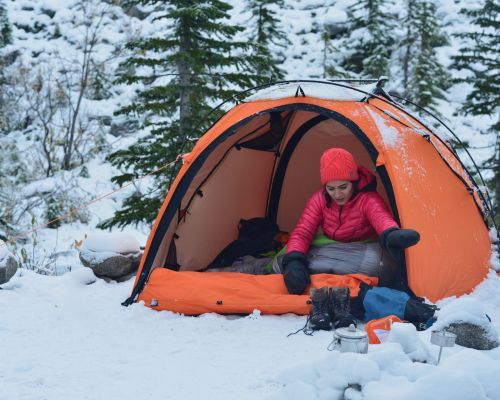
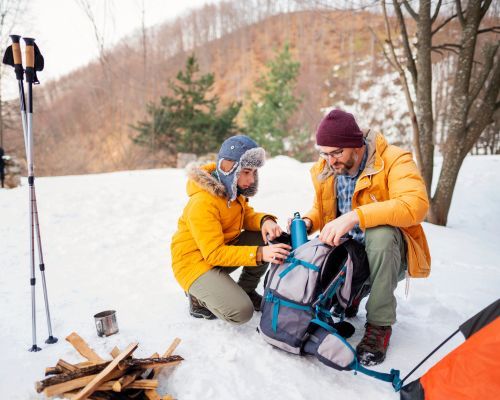
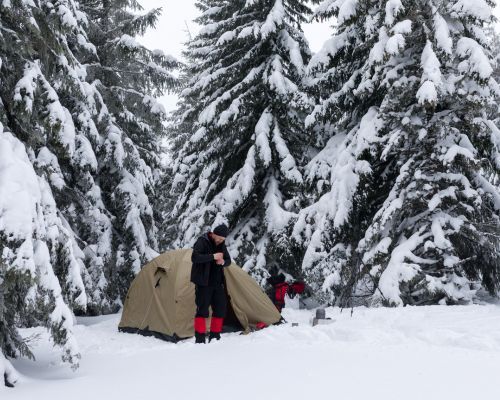
Winter Camping That Exhilarating Experience Sleeping In The Cold Yet Keeping Warm
Winter camping refers to the practice of camping during the winter season when temperatures are cold and snow or ice is present. It offers a unique and exhilarating outdoor experience for those who are willing to embrace the challenges and rewards of camping in winter conditions.
Winter camping may require specialized gear and equipment to stay warm. It can be a unique experience for outdoor enthusiasts who enjoy winter sports like skiing or snowboarding.
Pros of Winter Camping
Reduced crowds: Winter camping tends to attract fewer people compared to camping during the warmer seasons. This means you can enjoy a greater sense of solitude and tranquility in the wilderness, with fewer distractions and noise from other campers.
Stunning winter landscapes: Winter camping allows you to experience the beauty of snow-covered landscapes, frozen lakes, and frost-laden trees. The serene and picturesque surroundings can create a breathtaking and magical ambiance.
Winter sports and activities: Winter camping opens up opportunities for various outdoor activities, such as skiing, snowboarding, snowshoeing, ice fishing, and ice climbing. These activities add excitement and adventure to your camping experience and provide opportunities to engage with the winter environment.
Wildlife sightings: With fewer human disturbances, wildlife sightings can be more frequent during winter camping. You may have the chance to spot animals like deer, elk, foxes, or even elusive creatures like wolves or owls.
Self-reliance and survival skills: Winter camping requires a higher level of self-sufficiency and preparedness. You'll need to develop skills such as building proper shelters, managing fire in cold conditions, and staying warm and safe in low temperatures. This fosters personal growth, resilience, and self-confidence.
Mental and physical challenges: Winter camping presents mental and physical challenges, such as enduring the cold, staying motivated, and adapting to harsh conditions. Overcoming these challenges can provide a great sense of accomplishment and build inner strength.
Clear skies and celestial displays: Winter nights often offer clearer skies with less light pollution. This provides excellent opportunities for stargazing and witnessing celestial phenomena like the Northern Lights (Aurora Borealis), creating awe-inspiring and unforgettable moments.
Cons of Winter Camping
Cold exposure: Winter camping involves exposure to extremely cold temperatures, which can be uncomfortable and potentially dangerous if proper precautions are not taken. Frostbite and hypothermia are real risks.
Harsh weather: Winter storms, blizzards, and strong winds can pose challenges and increase the difficulty of camping in winter. Heavy snowfall may require more effort for setting up camp and can limit mobility.
Specialized gear requirements: Winter camping necessitates specific equipment designed for cold weather conditions, such as insulated sleeping bags, warm clothing layers, waterproof and insulated tents, and suitable footwear. Acquiring this gear can be costly.
Increased weight and bulk: Winter gear tends to be heavier and bulkier, making it more challenging to pack and carry. This may limit the amount of gear and supplies you can bring, affecting comfort and convenience.
Shorter daylight hours: Winter days are shorter, meaning you have fewer daylight hours to engage in outdoor activities and explore. This requires efficient time management and planning.
Increased energy consumption: Staying warm in cold temperatures requires more energy. Keeping your body warm, melting snow for water, and heating food can consume additional fuel and resources.
Limited campground availability: Many campgrounds and facilities may be closed or have limited services during the winter months. This reduces the options for established camping areas and may require more research and planning to find suitable locations for winter camping.
Hazards and risks: Winter conditions can pose hazards such as avalanches, icy trails, or unstable ice on bodies of water. It's crucial to know winter safety protocols, avalanche awareness, and proper navigation skills to ensure your safety during winter camping.
Knowledge and experience: Winter camping demands a higher level of knowledge and experience compared to camping in milder seasons. Skills such as snow camping techniques, cold weather survival skills, and understanding winter-specific risks are essential.
Additional preparation: Winter camping requires thorough planning, including checking weather forecasts, researching routes and trail conditions, and ensuring you have the necessary supplies and backup equipment in case of emergencies.
Limited outdoor activities: Some outdoor activities, such as swimming, fishing, or certain hiking trails, may be restricted or inaccessible during winter due to frozen water bodies or hazardous conditions. This can limit the range of activities available for enjoyment.
Hibernation and reduced wildlife sightings: Some wildlife species hibernate during winter, resulting in fewer wildlife sightings compared to other seasons. Wildlife activity and visibility may be reduced, impacting wildlife viewing opportunities.
It's important to note that winter camping requires careful planning, adequate preparation, and appropriate skills and gear. The challenges and risks associated with camping in cold and snowy conditions can be mitigated through proper knowledge, experience, and adherence to safety protocols.
The unique rewards of winter camping, including serene landscapes, solitude, and the opportunity for personal growth, can make it a truly remarkable and memorable outdoor experience for those who are well-prepared and embrace the winter environment.
Other Lesser Known Types of Camping
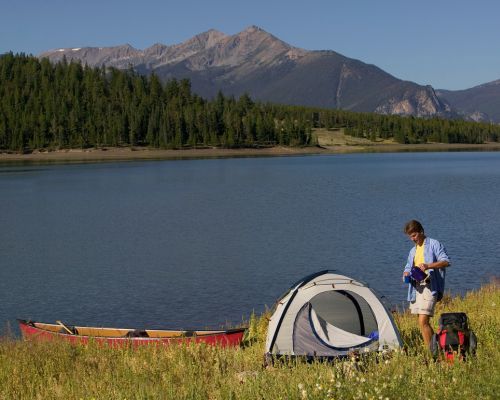
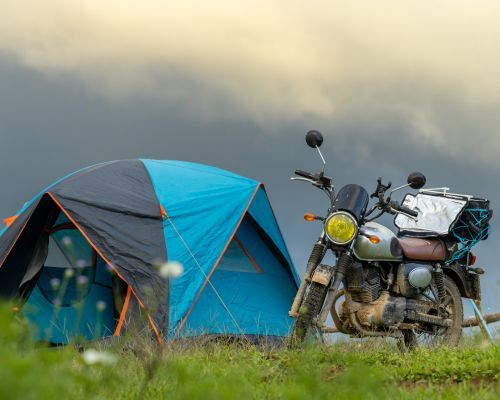
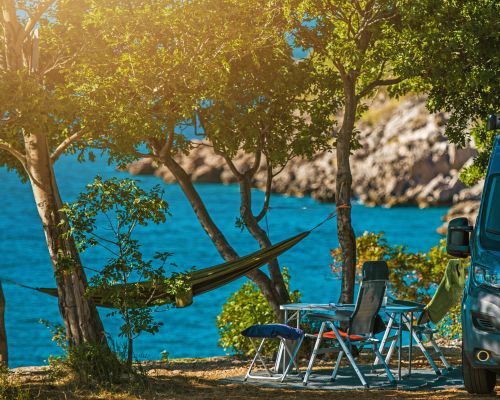
Canoe Camping, Motorcycle Camping & Hamock Camping
Canoe Camping
Canoe camping is a form of outdoor recreational activity that combines canoeing and camping. It involves traveling and camping in the wilderness or along rivers, lakes, or other bodies of water using a canoe as the primary mode of transportation.
In canoe camping, you typically load your camping gear and supplies into the canoe and paddle to a chosen campsite. The canoes used for this activity are specially designed for stability and carrying capacity, with enough space to accommodate camping gear, food, and other essentials.
Canoe camping allows you to access remote and less populated areas that may not be easily reachable by other means of transportation. It offers a unique opportunity to explore and experience the natural beauty of rivers, lakes, and waterways, while also enjoying the serenity of camping in the great outdoors.
During a canoe camping trip, you typically paddle to different campsites along the water route, setting up tents, cooking meals, and enjoying various outdoor activities such as fishing, swimming, hiking, or wildlife spotting.
The choice of campsites can range from established campgrounds with amenities like fire pits and picnic tables to more primitive and secluded spots that require minimal or no facilities.
Canoe camping requires some basic canoeing skills, including paddling techniques, navigation, and water safety. It's important to know the waterway being explored, including any hazards or regulations that may apply.
Proper planning and preparation are crucial, considering factors such as weather conditions, necessary permits or licenses, camping equipment, food supplies, and emergency provisions.
Overall, canoe camping provides a wonderful way to connect with nature, enjoy outdoor activities, and embark on memorable adventures along scenic waterways. It offers a unique blend of exploration, self-sufficiency, and appreciation for the natural environment.
Wild Camping
Wild camping, also known as primitive camping, free camping, or stealth camping, refers to setting up camp and spending the night in remote and undeveloped areas outside of designated campgrounds or established campsites. It involves camping in the wilderness, away from organized campsites, and without access to amenities such as toilets, water sources, or fire pits.
Wild camping is typically done in natural areas like forests, mountains, deserts, or along coastlines. The idea behind wild camping is to immerse oneself in nature, seek solitude, and experience a deeper connection with the environment. It allows campers to explore and appreciate remote and less-visited locations that may not be easily accessible through traditional campsites.
Campers should adhere to the principles of Leave No Trace, which emphasize minimizing the impact on the surroundings. This includes properly disposing of waste, avoiding damage to vegetation, and leaving the campsite as pristine as possible.
Since wild camping doesn't have amenities like water sources or toilets, campers must be self-reliant and carry everything they need, including water, food, shelter, and appropriate camping gear.
Wild camping involves being self-sufficient and responsible for personal safety. Campers should be prepared for potential hazards such as wildlife encounters, adverse weather conditions, or navigation challenges. Carrying appropriate safety gear, including a first aid kit, navigation tools, and communication devices, is advisable.
Wild camping can provide a sense of adventure, freedom, and a closer connection to nature. It allows campers to escape the crowds, enjoy solitude, and experience the tranquility of unspoiled natural settings.
Motorcycle Camping
Motorcycle camping, also known as moto-camping or moto-touring, is a type of outdoor adventure that combines motorcycle riding with camping. It involves traveling on a motorcycle to various destinations and camping overnight along the way. Motorcycle campers carry their camping gear, provisions, and other necessary items on their motorcycles.
Motorcycle camping offers a sense of freedom and exploration as riders have the flexibility to choose their routes, stop at scenic locations, and experience the open road. It allows riders to immerse themselves in nature, enjoys the thrill of riding, and camp in different landscapes, whether it's in the mountains, forests, deserts, or along coastlines.
To engage in motorcycle camping, riders need to have a suitable motorcycle for long-distance travel and carrying gear. These motorcycles often have larger fuel tanks, rugged construction, and additional storage options like panniers or saddlebags to accommodate camping gear.
When planning a motorcycle camping trip, riders must consider factors such as terrain, distance, and available campgrounds or campsites. They need to pack lightweight and compact camping equipment that can be securely fastened to the motorcycle, including a tent, sleeping bag, cooking gear, and other essentials.
During a motorcycle camping trip, riders typically travel during the day, enjoying scenic routes and exploring different areas. When it's time to camp, they set up their tents, cook meals, and relax around the campfire.
Safety is a crucial aspect of motorcycle camping. Riders should ensure they have appropriate riding gear, including helmets, protective clothing, and boots. It's also important to know about motorcycle maintenance, emergency repair skills, and familiarity with navigation tools such as GPS devices or maps.
Motorcycle camping offers a unique and thrilling way to combine the freedom of motorcycle travel with the simplicity of camping. It allows riders to explore new destinations, experience the joy of riding, and create lasting memories in the great outdoors. Born to be wild .....
Hammock Camping
Hammock camping is a form of outdoor camping where a hammock is used as the primary shelter instead of a traditional tent. It involves suspending a hammock between two trees or other sturdy anchor points and using it as a comfortable and elevated sleeping platform.
In hammock camping, the camper sets up their hammock by attaching the hammock's suspension system to the anchor points. This can be done using straps, ropes, or specialized hammock suspension systems.
Hammocks provide a more comfortable sleeping experience by contouring the shape of the body and relieving pressure points. They also allow for gentle swaying, which can be relaxing.
Hammocks are generally lighter and more compact than tents, making them a popular choice for backpackers or those looking to reduce their gear weight and bulk.
Hammocks can be set up in various environments, including forests, mountains, and even over rocky or uneven terrain where it might be challenging to find a suitable spot for a tent.
Hammocks provide excellent ventilation, allowing air to circulate the camper, which can be beneficial in hot and humid conditions.
Hammocks can be cooler than sleeping on the ground, making insulation necessary in colder weather. Under quilts, top quilts, sleeping pads, and sleeping bags specifically designed for hammock camping can help provide warmth.
Unlike a tent, hammocks leave campers more exposed to insects. Specialized bug nets can be used to provide protection.
While trees are commonly used as anchor points, it's essential to ensure that the trees are strong and properly spaced. In some environments, finding suitable anchor points may be a challenge.
Hammocks offer less privacy compared to tents. Depending on the camping location and personal preference, this may or may not be a concern.
Hammock camping requires some skill and knowledge to set up properly, especially regarding choosing the right hammock. It's important to consider safety and proper weight distribution.
Overall, hammock camping provides a unique and comfortable camping experience, allowing campers to enjoy nature from the comfort of a suspended hammock.
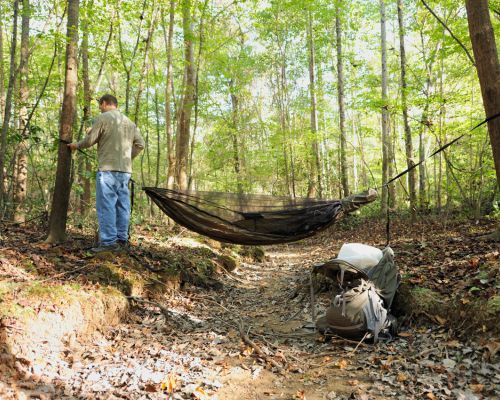
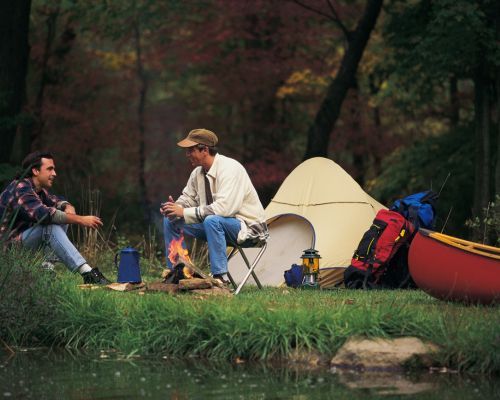
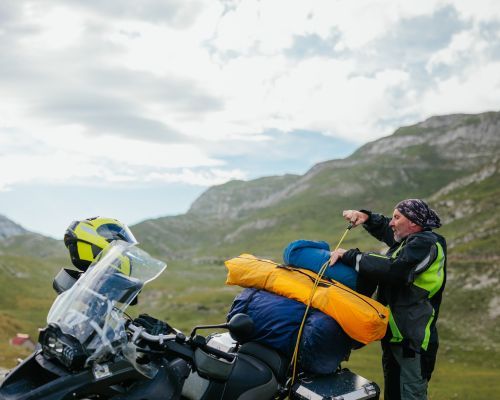
Take The Route Less Travelled - For that Added Excitement & Thrills
Back To 9 Different Types of Camping
That's it ... The different types of camping ..
Camping is a great way to get away from the hustle and bustle of everyday life and soak up nature’s beauty. Whether you’re seeking an exhilarating back-country experience, passing some time car camping with friends, or treating yourself to a luxurious glamping vacation, there is a camping style out there for everyone.
Don’t be afraid to try something different; most camping styles are more versatile than they seem! With the variety of camping-style options in existence, it can be hard to settle on the perfect one for you.
So grab your friends, gear up your tent, and start exploring — if it doesn’t quite fit the mold the first time around, at least you'll know what kind of camping adventure suits your camping style best for next time!
Let's not forget that getting outdoors also offers tremendous health benefits. It has been proven that spending time outdoors relieves stress and boosts overall wellness — something we could all use more of these days.
So go ahead, get out there and enjoy yourself in the great outdoors – no matter which type of camping trip you choose!
I personally absolutely love Tent Camping. So rustic, so intimate with nature, even the wild life, and refreshing! What is your camping style?
HAPPY CAMPING - ENJOY THE GREAT OUTDOORS
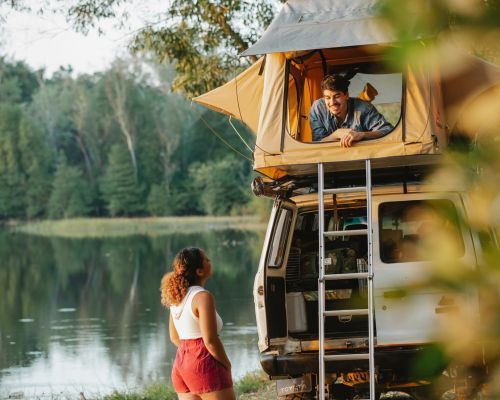
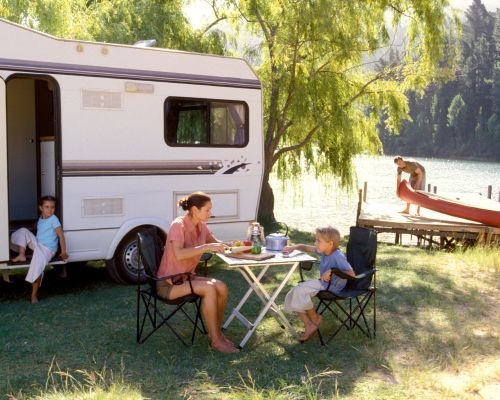
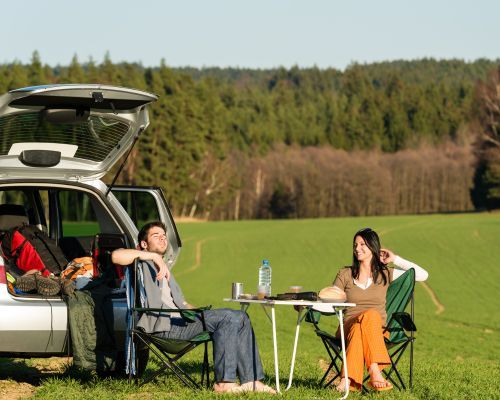
Living The Great Outdoors - Camping Is The way
Living The Great Outdoors with Trusted Outdoor Gear!
For great outdoor gear, check our takes on the Water Filter Straw, Crystal Water Bottle, Ooni Koda 12 Pizza Oven, and Camping Kitchen Chuck Box.
Interesting Nuggets
An expert’s essential tips for first-time campers
Gearing up to try camping? Here’s what beginners should know.
Find a Campground
There is no shortage of camping locations in the National Park Service -- there are over 130 park units to choose from! Use the map below to find a park with camping opportunities. Each location will link you directly to that park's website.
Where Can I Camp?
You can camp in a variety of places, from the backcountry wilderness of a national park to your backyard. Our guide will help you find a national park campground for you, your family, or a group of friends and give you tips on what to expect when you get there.
The 10 Best US national parks for RV Campers
Looking to get closer to nature and linger longer at a US national park in 2023? RV camping is the perfect way to experience the majestic wide-open spaces of the US national parks.
America's 5 Best National Parks for Camping
National parks are popular destinations for outdoor recreation and provide spectacular camping locations.
Plan Your Trip with Recreation.gov
To understand the different types of Camping Tents available, visit Amazon.com to see the vast selection of the different types of tents.Additional Information on RVs-Campers-Campervans
Recreational Vehicles (RVs), campers, and camper vans are all types of vehicles designed for recreational travel and camping. While they share similarities, they differ in terms of size, functionality, and features. Here's a detailed explanation of each type and two distinct pros and cons for RVs, campers, and camper vans:
Recreational Vehicles (RVs)
- Definition: RVs, also known as motorhomes, are self-contained vehicles that combine living quarters with motorized chassis. They are typically larger and more spacious compared to campers and camper vans.
Pros of RVs
- Spaciousness: RVs offer ample living space with separate sleeping areas, kitchens, and bathrooms, and often include slide-outs that expand the interior when parked.
- Comfort and amenities: They provide a wide range of amenities such as air conditioning, heating, full-size appliances, entertainment systems, and ample storage options.
Cons of RVs
- Size and maneuverability: The large size of RVs can make them challenging to maneuver in tight spaces, narrow roads, or crowded campgrounds. Driving an RV may require some practice and skill.
- Fuel consumption and maintenance: Due to their size and weight, RVs tend to have lower fuel efficiency compared to smaller vehicles. They may also require more maintenance and upkeep.
Campers
Definition: Campers, also known as travel trailers or caravans, are towable units that can be attached to a vehicle for transportation. They come in various sizes and configurations.
Pros of Campers
- Versatility: Campers offer the flexibility of being able to detach from the towing vehicle, allowing for easier exploration and maneuverability once you've reached your destination.
- Cost-effective: Campers are generally more affordable than RVs, making them an attractive option for those on a budget or occasional campers who don't require as much living space.
Cons of Campers
- Additional towing equipment: You need a suitable vehicle capable of towing the camper and may require additional equipment like a hitch and brake controller, which adds extra costs.
- Limited living space: Compared to RVs, campers usually have limited living space and amenities. They may have smaller kitchens, bathrooms, and sleeping areas, which can be a disadvantage for larger groups or extended trips.
Camper Vans
- Definition: Camper vans, also known as Class B motorhomes, are typically converted vans that have been modified to include basic living amenities and sleeping quarters.
Pros of Camper Vans
- Maneuverability: Camper vans are smaller in size compared to RVs, making them easier to drive, park, and maneuver in congested areas or narrow roads.
- Compact yet functional: Despite their smaller size, camper vans can still offer basic amenities like a kitchenette, sleeping area, and sometimes a small bathroom, providing a comfortable camping experience.
Cons of Camper Vans
- Limited space and storage: Camper vans generally have limited interior space, which can be restrictive for larger groups or longer trips. Storage space is often limited as well.
- Less comfort and luxury: Compared to larger RVs, camper vans may not offer the same level of comfort and luxury amenities due to their compact design. The living area may feel cramped for some individuals.
It's important to note that the pros and cons mentioned above can vary depending on specific models, designs, and personal preferences.
Return To RV-Campers-Campervan Camping
Disclosure: When you buy through links on our site, we may earn an affiliate commission from our partners at no additional cost to you. Thank you for your support!

